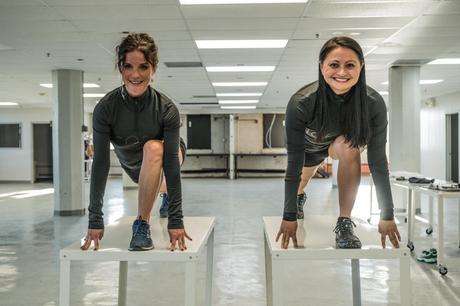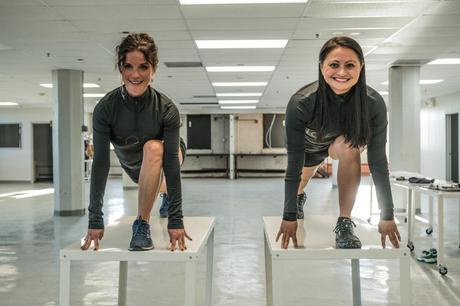As American cities like Detroit and St. Louis build ecosystems for local manufacturing, a contingent from Baltimore has quietly been laying the groundwork to strengthen the needle-trading industry.
In Baltimore, the goal is to revitalize the city's needle trade and promote design innovation and local businesses through Sew Bromo, an organization founded in 2021 by Stacy Stube, a veteran fashion executive. She is also the founder and president of the Fashion Innovation Hub. In August, the hub welcomed Buyback Baltimore's Needle Trades, an initiative that uses existing sewing machines to support future generations, to an 8,000-square-foot space. That same month, Sew Bromo founded the Fashion Heritage Needle Trades Foundation so that the knowledge of industry veterans would be passed on to the next generation of Baltimore fashion entrepreneurs.
More from WWDAfter working in the US and abroad for Burberry, Alexander McQueen, Hugo Boss, Abercrombie & Fitch, Victoria's Secret, Club Monaco and other brands, Stube moved back to her hometown in 2016 and worked for one of Baltimore's last needlework factories, Fashions Unlimited , as head of innovation. She moved on three years later because working with start-ups was not something management was interested in. Eager to work with local start-ups, guide prototype development and teach them other industry skills, she decided to take action.
At the height of the city's needle trade in the 1970s, a single city block housed 22,000 seamstresses and sewing machine operators, compared to 30 to 40 workers today. According to the U.S. Department of Labor, there were approximately 26,380 sewing machine operators in the entire U.S. in 2022. People don't realize that when a longtime, experienced owner of a needle trading factory dies, that operation usually closes because there are often no succession plans, Stube said. This declining base is a disservice to the fashion industry, as it limits the opportunities for new talent to develop prototypes or small runs.
The story continues
Stube is literally rushing to get things done, even though she has been campaigning to fund the industry for more than five years. After completing an eight-day, 200-mile solo run in the dead of winter to simply honor the city's needle-trading history, "all these industry veterans came out of the woodwork." Although most of them had left the industry and/or changed careers, a small number of them had continued to sew, taking them out of their garages and second rooms to create a new community of start-ups under Stube's advice. . The seasoned workers in the needle trade work with newcomers to share their skills and expertise.


As a result, what was initially a 30,000-square-foot space in an abandoned factory has grown into a 20,000-square-foot facility that houses veterans, entrepreneurs and needle trade nonprofits. "That floor just hums and sings. It is a pleasure to walk through it," says Stube. There is now an additional 800 square meters of space for the Fashion Innovation Hub on the sixth floor of the building, where users can develop prototypes, launch early-stage companies and develop innovation in soft goods.
Buyback Baltimore's Needle Trade campaign culminates with a memorable sporting event this summer. Stube has also been training for the "Bali to Baltimore Run," which will cover 333 miles in 10 days, with another Baltimore entrepreneur, Nicole Myrick, co-founder of the Truuce bedding company. They will cover the distance with Valentine Lily, the longest distance runner in Indonesia. The name of the run is a nod to the run Stube and Lily did in 2016, which covered the perimeter of Bali, where Stube was working at the time. They aim to exceed the $100,000 fundraising goal for Buyback Baltimore's Needle Trade campaign. All three women wear clothing from the Fashion Innovation Hub.
"As we know, Under Armor is headquartered here, but very little of their work is produced here. This [run] is really intended to activate the running community to see that many of the garments they wear [are not made in the U.S.] We want people to turn the tags inside out so they can see where they were made on the labels. That's where you invest your dollars," Stube said.
Under Armor features the UA Lighthouse Manufacturing and Design Leadership Center, a 31,000-square-foot state-of-the-art facility to assist with larger production runs, while the Fashion Innovation Hub focuses on startups looking to build their business and keep their manufacturing rooted in Baltimore .
Funds from the campaign have been and will be used for equipment in the innovation space for the benefit of participants such as Girl in Space Club and Truuce. Another local brand, WhitePaws RunMitts, a running glove company founded by Susan Clayton that has distribution in REI and other stores, will soon roll out a children's version for the local Needle Trade campaign by developing the prototypes locally.
Stube is aware of the potential for other cities to create fashion-oriented infrastructures and is open to sharing information. Stube said she has shared notes with Britain's Fashion Enter organization, which is trying to maintain needle trade skills, as it did by absorbing the 75 machinists from a Laura Ashley factory in Wales. While Stube focuses on little-known entrepreneurs in early stage launches, Fashion Enter works directly with more established forces in the industry.
"Baltimore is the capital for impact-driven needle trading," says Stube, who is trying to attract more prototyping, pre-sales and testing from the local market. "In the fashion industry, so many businesses never get off the ground because they can never get to prototypes," she said. "Traditional factory workers work on the same thing day in and day out, so they get up to speed quickly. But they don't think about the entire product that is being made. That's why you need innovative sewing machines. If we can build this in Baltimore, it will save costs for people who don't have to travel to Asia."
The Baltimore-centric infrastructure is a good fit for DTC brands because it "removes some of the exploitative elements in an industry that tries to save money by making money abroad. If you sell DTC and want to invest in local communities, you may not need those cost savings," Stube said.
The best of WWD